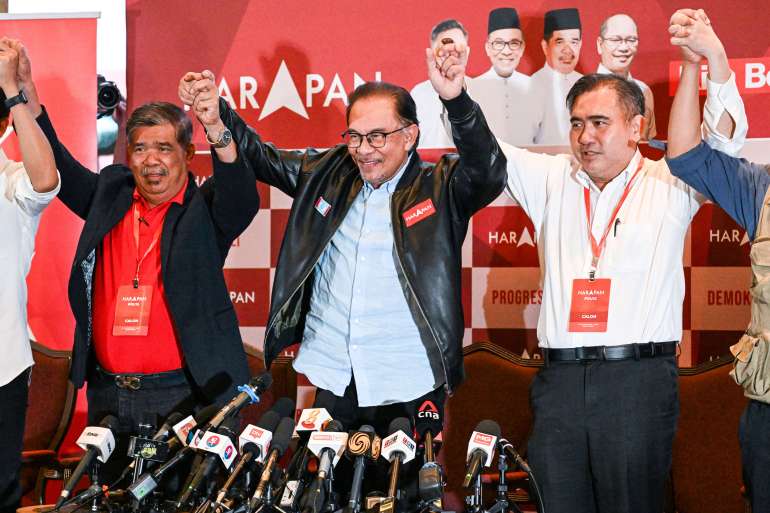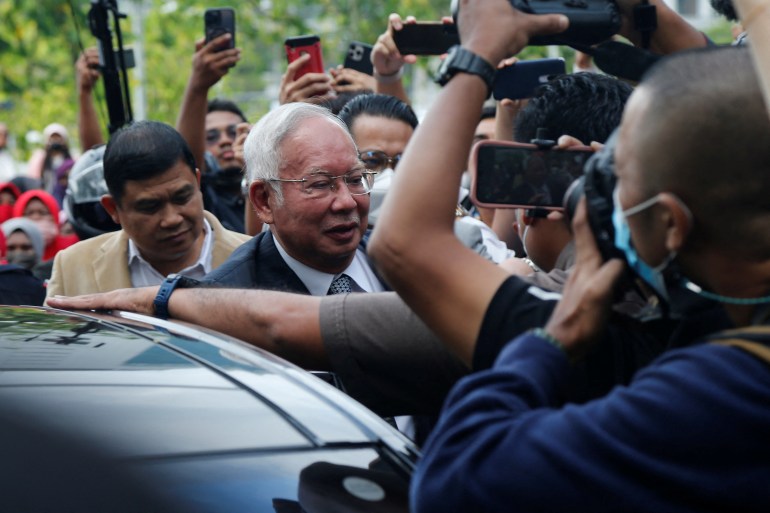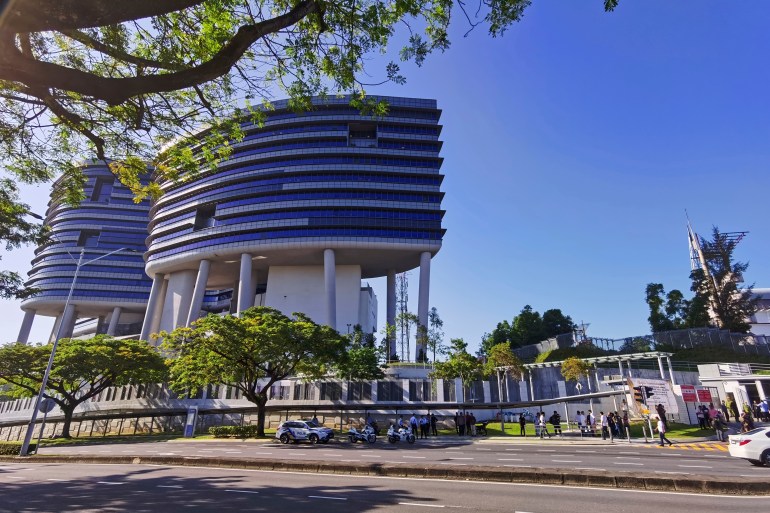Malaysian ex-PM’s arrest puts focus on Anwar’s corruption fight | Corruption
Kuala Lumpur, Malaysia – Addressing an investment forum this week, Malaysian Prime Minister Anwar Ibrahim said his administration would not tolerate corruption regardless of an official’s rank or political connections and pledged to tackle misconduct “without fear or favour”.
Less than 48 hours later, Malaysia’s former Prime Minister Muhyiddin Yassin was charged with multiple counts of corruption related to directly-negotiated government contracts during the COVID-19 pandemic.
The charges against Muhyiddin, announced by the Malaysian Anti-Corruption Commission (MACC) in Kuala Lumpur on Friday, represent the most striking move yet against alleged malfeasance since Anwar came to power last year on a pledge to clean up the Southeast Asian nation’s politics.
Though the MACC is officially independent of the government, the charges against Muhyiddin, which include money laundering and abuse of power, could bolster the reformist Anwar’s anti-corruption drive and “allow his government to showcase progress under his leadership”, said Grace Lee Hooi Yean, the head of Monash University Malaysia’s economics department.
“This will instil hope in people that progress and advancement can be achieved in the country,” Lee told Al Jazeera, describing the investigation as a potential “turning point” in Malaysia’s efforts to tackle corruption.
“This will also be a big vote of confidence for Anwar’s leadership and he will be credited for this development.”

Anwar, a former student leader whose election capped an extraordinary three-decade journey from leader-in-waiting to jailed opposition leader and back again, has staked much of his reputation and political legitimacy on rooting out corruption in Malaysia. The country has been repeatedly rocked by impropriety involving the rich and powerful, including the long-running scandal surrounding the sovereign wealth fund 1MDB.
Former Prime Minister Najib Razak, who led Malaysia between 2009 and 2018, is currently serving a 12-year prison term over his role in the 1MDB affair, which saw an estimated $4.5bn looted from state coffers.
Respected in Western financial circles for his tenure as finance minister during the 1997-98 Asian Financial Crisis, Anwar has stressed the importance of restoring investors’ confidence in the economy and repairing the country’s battered image overseas.
Shortly after his November election win, Anwar ordered a review of government projects, worth billions of Malaysian ringgit, which he said the Muhyiddin administration had undertaken without going through the proper processes during its 17 months in power.
In January, Anwar, who is also the finance minister, said that Malaysia – whose gross domestic product (GDP) per capita is less than that of China – had the potential to become a developed country if it could stamp out the problem of corrupt officials pilfering its wealth.
Malaysia last year ranked 61 out of 180 countries in Transparency International’s Corruption Perception Index, down 10 spots from 2019.
Anwar’s first 100 days in office have not been without controversies, which have challenged his efforts to cultivate an image of accountability and transparency.
Last month, Anwar’s daughter Nurul Izzah Anwar resigned as a senior economics and finance adviser to the prime minister following a backlash over perceived nepotism.
Anwar has also been criticised for appointing Ahmad Zahid Hamidi, who is on trial for corruption, as his deputy prime minister to secure the support of the graft-tainted and once politically-dominant United Malays National Organisation (UMNO) for his multi-racial unity government.
Several members of Anwar’s own Pakatan Harapan (PH) coalition – including former sports minister Syed Saddiq Syed Abdul Rahman and Democratic Action Party national chairman Lim Guan Eng – are also on trial for corruption-related charges.

Niaz Asadullah, a professor of economics at Monash University Malaysia, said many Malaysians are now sceptical of Anwar’s commitment to cleaning up politics.
“Understandably, Anwar is keen for his anti-corruption campaign to regain momentum,” Asadullah told Al Jazeera.
“For now, the resignation of Izzah Anwar has helped position Anwar as a ‘responsive leader’ who is open to public criticism even if it involves his own family members. But the public pursuit of former Prime Minister Muhyiddin Yassin Anwar, his closest political challenger, presents a bigger and perfect opportunity that may help kill several birds with one stone.”
There have also been claims that the charges against Muhyiddin, Anwar’s chief rival to the premiership after the last election, may have as much or more to do with politics as tackling corruption.
Muhyiddin, who has sought a judicial review to challenge a travel ban against him and the freezing of his party’s bank accounts, has denied wrongdoing.
He and other members of his Bersatu party have described the allegations, including that the then-ruling party improperly received 300 million ringgit ($66.33m) from contractors awarded projects during the pandemic, as a political witch hunt.
On Thursday, Muhyiddin told reporters that Anwar wished to derail his Perikatan Nasional coalition, which enjoys strong support among the majority ethnic Malay Muslims, in upcoming state elections and would be “punished by the people”.
The most serious of the charges against Muhyiddin carries a penalty of up to 20 years in prison.

Anwar has repeatedly denied directing or interfering in the MACC’s investigations, which have been ongoing for months, insisting his only involvement has been to disclose projects by the previous administration that did not go through the tender process.
“We still do not know the results of the investigation since he has been called only very recently,” Anwar was quoted as saying by the Malay Mail on Thursday. “But if you said all cases are politically motivated, then how are we going to arrest people for big corruption cases?”
A spokesman for Anwar’s PH coalition did not respond to a request for comment.
As Anwar is not directly responsible for investigating crimes or making arrests, some Malaysians will see the MACC’s move as a “bold step” that shows it is “autonomous and empowered to act against the political heavyweights and that no one is ‘too big to jail’ during Anwar’s tenure”, said Asadullah, the Monash University professor.
“In reality, however, this is potentially a veiled attempt to consolidate political power by delegitimising the biggest immediate as well as long-term political threat to Anwar’s unity government.”

Pingback: check these guys out
Pingback: pgslot
Pingback: colorado mushroom company psychedelic
Pingback: 1xbet
Pingback: Diyala University 1st